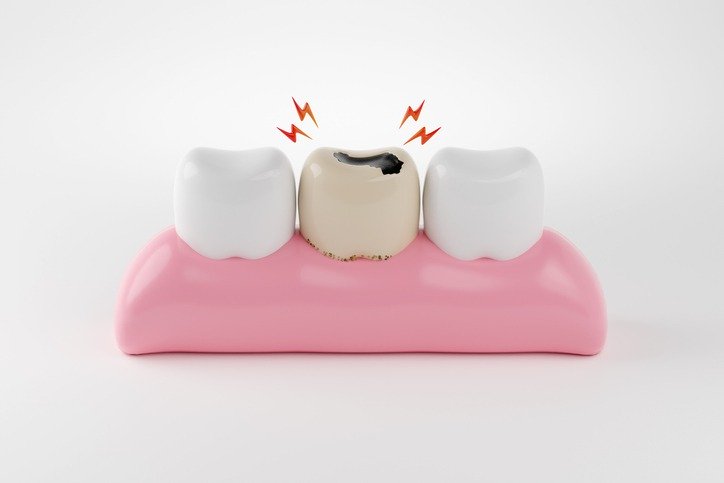
Top 4 Root Canal Pros and Cons: Is It for You?
Tooth decay is caused by bacteria in the mouth and poor dental hygiene. Teeth can become infected through cavities, periodontal disease, or physical trauma, which may require root canal treatment. This common dental procedure can effectively address the infection and save a person’s natural teeth, improving their smile and self-confidence while also relieving severe pain and suffering.
What is a root canal treatment?
In cases where the tooth’s pulp has become inflamed or infected, root canal therapy can save the tooth. A cavity that goes deep into the tooth structure or experiencing facial or tooth trauma are the most common causes. The tooth pulp contains blood vessels, nerves, and connective tissue.
The infected pulp tissue in your tooth’s pulp chamber is removed during the procedure. This is when the root canal treated tooth is filled, sealed, and disinfected. A dental crown is typically placed over the tooth’s structure to protect it from breaking or chipping. This dental procedure removes contaminated tissue from an infected tooth and seals it to protect the unaffected tooth.
When is a Root Canal Treatment Procedure Needed?
A dental filling is typically sufficient when a cavity is discovered and treated quickly enough. Dentists perform root canal therapy to save severely decayed or untreated teeth, as well as to address tooth fractures, dental infections, occlusion problems, and past dental trauma.
A dentist can treat root canals by removing the pulp, meticulously shaping and cleaning the canals, and filling the canals to create a seal. Usually, endodontic specialists recommend a dental crown or other alternatives required to strengthen and safeguard your teeth. Furthermore, since every patient’s case may differ, it is ultimately up to the dentist to determine whether or not the treatment is necessary.
The benefits and cons of root canal procedures are vital, and you should be aware of both before scheduling an appointment. By understanding what comes with this medical procedure, you will be able to make a wise choice. When you’re ready, you can book an operation with a professional to make sure your treatment and symptoms are managed effectively.

Advantages of Root Canal Treatment
Preserves the Natural Tooth
Patients who receive root canal treatment can maintain their teeth and prevent infection spread, making them more cosmetically appealing. Dentists clean the root canal, remove any infected or inflamed pulp tissue, and fill it up. Patients can avoid worrying about bone loss as the tooth’s root will continue stimulating it. Sometimes, dentists may even require antibiotics to be taken before the procedure especially if an infection is present to avoid its spread and to have better chances of a successful outcome.
Eliminates Toothache
It hurts quite a bit when the pulp is infected or inflamed. When you have a debilitating toothache, it’s hard to do anything. A root canal procedure done in a dental office removes the infected or inflamed pulp; if necessary, antibiotics are used to treat the area. The toothache goes away once the infection is treated.
Root Canal Treatment: Saves Tooth and Prevents Jawbone Degeneration
In contrast to tooth extraction, a root canal preserves the affected tooth. This method offers an alternative to having the tooth pulled as the jawbone readily deteriorates with lost teeth over time. Therefore, root canal treatments lessen the risk of developing future jawbone issues.
Rather than a tooth extraction, a root canal procedure helps keep your teeth’s natural alignment and arrangement. Gaps left by extraction can cause problems as the face adjusts to the new shape of the jaw. This affects one’s facial features and makes it challenging to chew food. With this surgical procedure, you won’t have to worry about such problems since there are no gaps to worry about.
Almost Painless Procedure
The rehabilitation from this dental treatment than the extraction of your natural tooth is incomparable. Modern methods and local anesthesia make root canal procedures a lot more painless than tooth extractions, according to the American Association of Endodontists.
Disadvantages of Root Canal Treatment
Weakens the Tooth’s Foundation
During root canal therapy, a dental crown is placed on the tooth to protect it from further damage and to seal off the inside. Getting this dental treatment entails drilling into the tooth and replacing it with a dental crown which even when preserved, leaves it weaker than a natural tooth’s normal function and integrity. This then makes the teeth more prone to cracking or brittleness.
Requires Multiple Sessions
Another disadvantage is how long a root canal treatment takes. Most patients only require one appointment with the dentist to accomplish this procedure. However, two to three consultations and further treatment are needed in problematic situations where the infection or damage is significant.
In addition, getting root canals on the upper first molars may take patients two to three appointments. Because each of the three to five root canals in the upper first molars must be handled separately, the procedure takes longer.
Entails Risk of Side Canal decay
An infection causing a toothache can be treated with a root canal and replaced with a filling material. Most people believe that eliminating the inflamed or infected pulp has taken care of your issues, but there may be some associated risks to this. During the process, the dentist does not touch the numerous tiny side canals which may eventually rot and die, encouraging the growth of bacteria and infections when the infected pulp and nerve of the tooth root are removed.
Causes Inflammation
After the operation, some people may experience discomfort and inflammation caused by the infection and procedure. This usually shows within 24 hours and should subside within at least 72 hours. If you experience prolonged or notice new facial swelling, contact your dentist immediately.
Final Thoughts
Choosing between a root canal and another treatment option like endodontic surgery or dental implant can be challenging. Numerous factors must be considered, including money, your tooth’s prognosis, any underlying medical concerns, your current state of dental health, etc. If you want to save your teeth, root canal treatment is ultimately preferable to getting your tooth extracted. While this can be a significant expense, having this treatment done only when suggested by a specialist or general dentist can benefit you in the long run.






























































